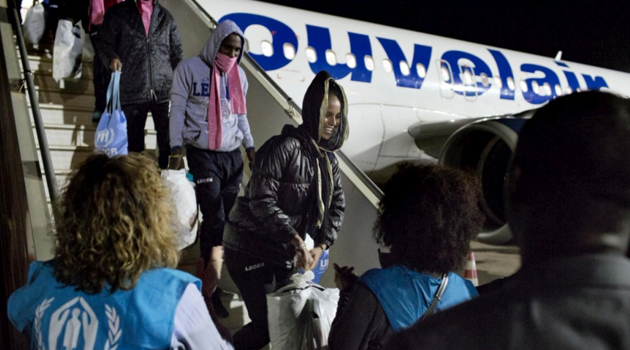Since November, UNHCR, the UN Refugee Agency, has evacuated over 1,000 highly vulnerable refugees out of Libya and is looking for durable solutions for them in third countries.
On Tuesday, a flight departed from Tripoli bound for, Niamey, Niger, carrying 128 refugees and on Wednesday, a second plane took 150 refugees from Tripoli to Rome, Italy, bringing to 1,084 the total number of refugees evacuated since the beginning of UNHCR’s operation, three months ago.
“These evacuations have provided a new chance at life for more than 1,000 refugees who were detained in Libya and suffered tremendously. By the end of 2018, we hope to evacuate thousands more,” said Vincent Cochetel, UNHCR’s special Envoy for the Central Mediterranean.
With the cooperation of UNHCR’s partners and thanks to the crucial support of the government of Niger, the 128 refugees evacuated to Niger on Tuesday, 13 February, are being accommodated in guesthouses in Niamey, where assistance and psychosocial support are made available pending resettlement or other durable solutions.
So far, 770 refugees have been evacuated to Niger, including single mothers, families and unaccompanied and separated children.
The 150 highly vulnerable refugees who were evacuated from Tripoli to Rome on Wednesday included children and women who had been held captive for long periods of time. This was the second evacuation from Libya directly to Italy and could not have happened without the strong commitment of the Italian authorities and the support of the Libyan Government.
In total, 312 refugees have been evacuated directly to Italy. Upon arrival in Rome, refugees go through medical checks and are provided with warm clothes and a hot meal before undergoing identification procedures. The refugees are then transferred to various reception facilities.
“These evacuations are the best example of the impact that international solidarity can have on refugees themselves; however, much more needs to be done. Only 16,940 resettlement places have been received so far for the 15 priority countries of asylum along the Central Mediterranean route, including Libya and Niger. We call on all countries to come forth with additional places that will provide a tangible solution for many more refugees who are still in Libya,” added Cochetel.
(Source: UNSMIL)





